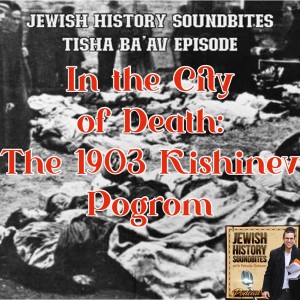
1.7M
Downloads
457
Episodes
Listen to noted Tour Guide, Lecturer and Yad Vashem Researcher of Jewish History Yehuda Geberer bring the world of pre-war Eastern Europe alive. Join in to meet the great personages, institutions and episodes of a riveting past. For speaking engagements or tours in Israel or Eastern Europe Yehuda@YehudaGeberer.com
Episodes

Saturday Jul 17, 2021
In the City of Death: The 1903 Kishinev Pogrom
Saturday Jul 17, 2021
Saturday Jul 17, 2021
Special Tisha Ba'av Episode
The 1903 Kishinev Pogrom was a tragic massacre, with reverberations within the wider Jewish world remaining until this very day. Goaded on by anti-Semitic newspapers with cries of 'Death to the Jews', a blood libel was fabricated and a mob was unleashed on Easter Sunday, April 19, 1903. Leaving 49 killed, hundreds maimed and injured in its wake, Jewish property was destroyed and looted as well. Claims of complicity of the police and government were voiced in many quarters.
But it was primarily the after effects of this pogrom which had a long term transformative effect on Jewish society in Russia and worldwide. The great immigration to the United States was already long underway, but it significantly intensified in the years following Kishinev and the subsequent 1905 revolution. American Jewry was galvanized to assist the victims, and this cemented the relationship US Jewry was to have with their brethren back in Eastern Europe.
Within Russia, many of the Jewish youth became radicalized as a result of the massacre, joining clandestine revolutionary organizations with the goal of overthrowing the Czar.
The most profound impact was felt within the nascent Zionist movement. Chaim Nachman Bialik was dispatched by the historian Shimon Dubnow to gather testimonies from survivors. Following his five week stay in Kishinev, Bialik penned 'Be'ir Hahareiga' - In the City of Death, a poem about the pogrom. Powerfully written, it also included strongly worded accusations in regards to the perceived passivity of the victims. The poem and its message was to have an immense impact, as it was published and translated and became immensely popular. Vladimir Jabotinsky's conclusion was to organize Jewish self defense, and Theodore Herzl's conclusion was the Uganda proposal at the Sixth Zionist Congress.
The shadow of the Kishinev tragedy was to hover over the many subsequent, and ever greater tragedies of the bloody 20th century.
For sponsorship opportunities about your favorite topics of Jewish history contact Yehuda at: yehuda@yehudageberer.com
Subscribe To Our Podcast on:
PodBean: https://jsoundbites.podbean.com/
Follow us on Twitter or Instagram at @Jsoundbites
You can email Yehuda at yehuda@yehudageberer.com
Version: 20241125

No comments yet. Be the first to say something!